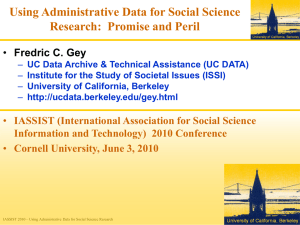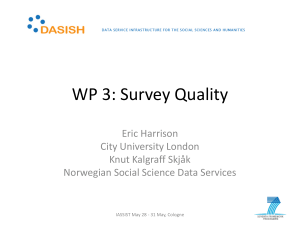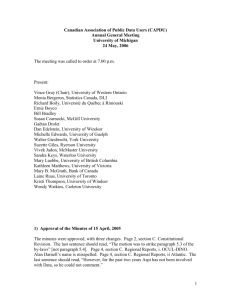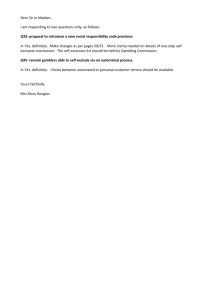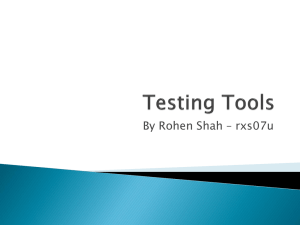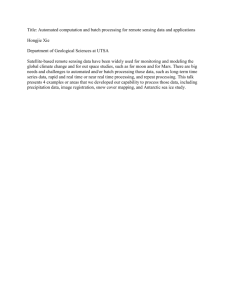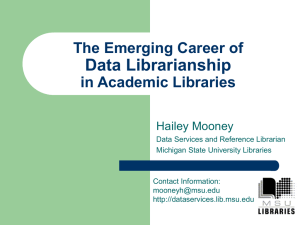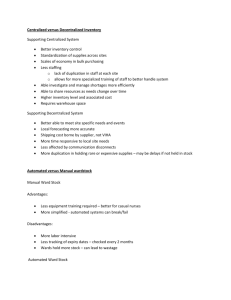presentation
advertisement
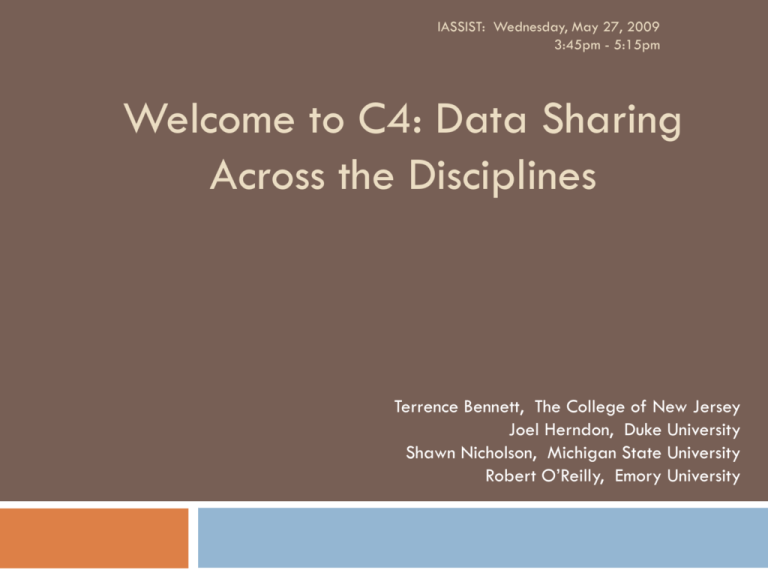
IASSIST: Wednesday, May 27, 2009 3:45pm - 5:15pm Welcome to C4: Data Sharing Across the Disciplines Terrence Bennett, The College of New Jersey Joel Herndon, Duke University Shawn Nicholson, Michigan State University Robert O’Reilly, Emory University Scholarly Primitive Clickstream Acuity Decisiveness Seizes Scavenger Opportunistic; seldom attacking IASSIST: May 27, 2009 Terrence Bennett, The College of New Jersey Data Sharing Across the DisciplineData sharing behavior An empirical study Data sharing behavior Why do researchers share? Advance scholarship and inquiry Comply with ethical imperatives Support open access Why might researchers be reluctant to share? Need for confidentiality Competitive advantage of secrecy Lack of infrastructure that supports sharing Too much trouble IASSIST: May 27, 2009 Study: Data sharing in life sciences* Surveyed trainees in life sciences (and compared with computer science and chemical engineering) Results were disturbing 23% were denied access to published data; 21% were denied access to unpublished data 8% had denied requests from others for access to data 51% reported that withholding of data had a negative effect on research progress *Vogeli, C. et al. (2006). Data withholding and the next generation of scientists: Results of a national survey. Academic Medicine 81(2), p. 128-136. IASSIST: May 27, 2009 These results raise new questions Are dissertators sharing? Do dissertators in the life sciences share better than their counterparts in the social sciences? IASSIST: May 27, 2009 Methodology Searched PQDT database Restricted to PhD dissertations Limited to most recent five years Used PQDT controlled subject index (5 disciplines): Political Science Cell Biology Psychology Biochemistry Genetics IASSIST: May 27, 2009 Methodology (continued) Random sort of results from each discipline Selected 12 from each discipline N = 60 (not a multinational sample) Coded for 9 variables related to presence of data and availability of data for sharing IASSIST: May 27, 2009 Research questions Do abstracts and tables of contents accurately indicate the presence of data? What is the nature of the data collected? Origin Functional category Is data scarce? Valuable? Is data automated? Are there disciplinary differences regarding dataset use, reuse, and availability? IASSIST: May 27, 2009 Findings: abstracts and TOCs Great variation in the percentage of author-supplied abstracts that indicate the use or availability of data collections Poli Sci 25% Data cited Data not mentioned 75% Cell Bio 25% 75% Data cited Data not mentioned For detailed findings, be sure to visit us during the poster session! IASSIST: May 27, 2009 Findings: data category* Datasets are predominantly dissertation-specific 12 10 Research 8 Resource 6 Reference 4 2 Undefined / Other 0 Genetics Cell Bio Psych Biochem Poli Sci *National Science Foundation (2005), The elements of the digital data collections universe. Ch. 2 (p. 17-23) in Long-lived digital data collections enabling research and education in the 21 st Century). IASSIST: May 27, 2009 Findings: data automation 12 Multiple types of data; not automated 10 Multiple types of data; highly automated 8 Quantitative data, highly automated 6 Text or other qualitative data, highly automated 4 2 Quantitative data, not automated 0 Text or other qualitative data, not automated Genetics Cell Bio Psych Unknown/undefined Biochem Poli Sci IASSIST: May 27, 2009 Findings: data availability Data destroyed 12 10 Not in document; web search unsuccessful 8 6 Citation in document may point to data 4 Citation to data in document 2 Data in document 0 Genetics Cell Bio Not available Psych Biochem Poli Sci IASSIST: May 27, 2009 Conclusions Dissertation datasets tend to be configured to serve only the immediate need of the dissertation; this leads to interesting questions for archiving and preservation. Dissertators in the life sciences may be slightly better than their social sciences counterparts in depositing data in repositories. IASSIST: May 27, 2009 Conclusions Highly automated data collecting does not lead to increased data sharing, despite strong theoretical support for this result. Very few dissertators are embracing the open data movement. IASSIST: May 27, 2009 Further questions / next steps Need stronger empirical data – larger sample; more disciplines; not limited to dissertations Implications for saving/preserving/disseminating research data Are disciplinary differences in data sharing behavior inevitable? What is the role of librarians in promoting data sharing across the disciplines? IASSIST: May 27, 2009
